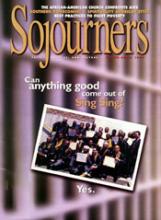Historically, African-American church leaders have provided guidance and support in our struggle for civil rights. They lead the songs of nonviolent protest for equality in education, housing, and employment. As Rev. Wyatt Tee Walker once wrote, "If you listen to what African-Americans are singing religiously, it is a clue to what is happening to them sociologically."
Why was the church silent for so long about HIV/AIDS? Early in the epidemic, there were so many mixed messages. HIV was first depicted primarily as a disease of white gay men. Then we were told Haitian immigrants, sex industry workers (prostitutes), and the African green monkey were the cause for the spread of the disease. What response could the African-American church provide, when historically we people of color have been blamed for the social ills of America?
Addressing HIV/AIDS meant discussing man-to-man sex, IV drug-using behavior, and issues seen as problems of the world beyond of the walls of the church. Consequently, persons living with HIV/AIDS (PWAs) were blamed for their illness, feared, and stigmatized. Their families were embarrassed and ashamed. Although this insidious virus was taking a devastating toll, a wall of shame and denial was erected between the African-American community and the church.
Faced with little or no information and support network, African-American gay and heterosexual HIV/AIDS activists had to learn from white gay activists how to discuss the virus and educate our community. When many churches did not respond with compassion, PWAs created their own support systems and even churches. The issue of loss in our community became so great that family members began to knock down the walls of shame to seek guidance and prayer from church leaders.
Read the Full Article
